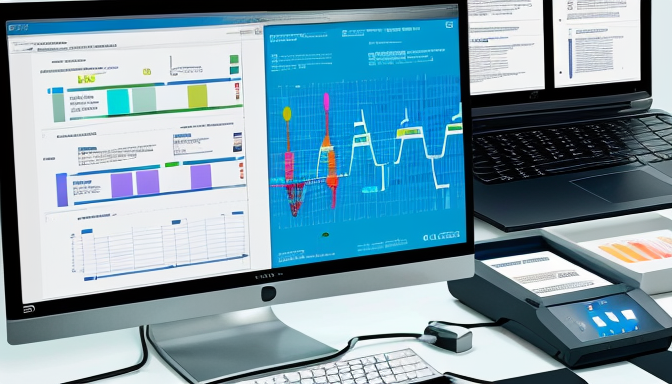Have you ever wondered about your roots? DNA testing has become a fascinating gateway into understanding our ancestry, health, and personal identity. It’s like opening a treasure chest of information that connects you to generations past. Imagine holding a key that unlocks the stories of your ancestors, revealing where they came from and how their journeys shaped your existence. With just a simple test, you can dive deep into your genetic makeup and uncover a narrative that may surprise you.
At its core, DNA testing analyzes your genetic material, which contains the blueprint of your biological history. This intricate process involves extracting DNA from a sample, often collected through a cheek swab or saliva. The testing companies then examine specific markers in your DNA that can indicate your ethnic background and familial connections. It’s a bit like piecing together a jigsaw puzzle, where each piece represents a part of your heritage. The results can show you not only where your ancestors originated but also reveal fascinating insights into your health predispositions.
However, while the allure of uncovering your past is exciting, it’s essential to recognize the limitations and ethical considerations that come with DNA testing. For instance, the accuracy of ethnicity estimates can vary, and privacy concerns about data usage are paramount. As you embark on this journey of self-discovery, it’s crucial to approach your results with an open mind and a critical eye. After all, understanding your DNA is not just about tracing lineage; it’s about embracing the rich tapestry of your identity.
The Science Behind DNA Testing
Understanding the biological basis of DNA tests is crucial for anyone curious about their heritage or health. At its core, DNA (deoxyribonucleic acid) is the blueprint of life, containing the genetic instructions that make each individual unique. This intricate molecule is composed of nucleotides, which are the building blocks of DNA. Each person’s DNA is a combination of genetic material inherited from their parents, creating a unique genetic fingerprint.
When you undergo a DNA test, your sample—usually saliva or a cheek swab—is analyzed for specific genetic markers. These markers can reveal a wealth of information about your ancestry and lineage. For instance, certain markers are associated with specific populations, allowing scientists to trace lineage back through generations. The process typically involves comparing your DNA to a reference database containing genetic information from diverse groups around the world.
Here’s a simplified breakdown of how DNA testing works:
- Sample Collection: A simple swab or saliva sample is collected.
- DNA Extraction: The DNA is extracted from the cells in your sample.
- Genetic Analysis: The extracted DNA is analyzed for specific markers.
- Data Comparison: Your genetic markers are compared against a large database.
- Results Interpretation: The findings are compiled into a report detailing your ancestry and potential health risks.
This scientific approach not only helps in tracing your ancestry but also sheds light on potential health predispositions, making DNA testing a powerful tool for understanding oneself. However, it’s important to remember that while DNA can provide clues about our past, it doesn’t tell the whole story. Environmental factors, personal experiences, and cultural influences also shape our identities.
When it comes to uncovering your ancestry and understanding your genetic makeup, DNA tests come in various flavors, each tailored to meet different needs. It’s like choosing a tool from a toolbox; each one serves a specific purpose. The three primary types of DNA tests that most people encounter are autosomal DNA tests, Y-DNA tests, and mitochondrial DNA tests. Let’s break them down.
Autosomal DNA tests are the most common type and analyze the DNA inherited from both parents. Think of it as a family tree in a bottle; it provides a broad overview of your ancestry by examining genetic markers from all your ancestors. This type of test can reveal your ethnic background and connect you with relatives across multiple generations.
On the other hand, Y-DNA tests are a bit more specialized. They focus on the Y chromosome, which is passed down from father to son. This means that only males can take this test, making it a powerful tool for tracing paternal lineage. If you’re curious about your father’s side of the family, this test can help you discover your roots, revealing connections that go back hundreds or even thousands of years.
Then we have mitochondrial DNA tests, which look at the DNA passed from mothers to their children. This type of test is invaluable for those wanting to trace maternal ancestry. Just like Y-DNA tests, it can provide insights into lineage but through the maternal line. So, if you’re interested in where your maternal ancestors came from, this is the way to go.
In summary, the choice of DNA test largely depends on what you’re looking to discover. Whether you’re seeking a broad understanding of your heritage or digging deeper into a specific lineage, there’s a DNA test designed just for you!

Interpreting Your Results
So, you’ve finally received your DNA test results! Exciting, right? But hold on—what does all that data actually mean? Understanding your results can feel like trying to decipher a foreign language. Don’t worry, though; I’m here to help you navigate through the maze of genetic information. First, let’s break down the key components you’ll encounter.
Most DNA tests will provide you with an ethnicity estimate, which is like a snapshot of your ancestral background. This estimate is derived from comparing your DNA to reference populations around the world. For example, you might find out that you have a surprising percentage of Scandinavian heritage! Keep in mind, however, that these estimates can vary significantly between companies, so it’s wise to approach them with an open mind.
Next up, you might see information about genetic traits. These traits can include anything from your likelihood of having curly hair to your sensitivity to caffeine. While it’s fascinating to learn about these traits, remember that they don’t define you completely. Think of them as pieces of a puzzle that contribute to your unique picture.
Now, here’s where it gets a bit tricky—variant reports. These reports highlight specific genetic variants that could be linked to health conditions. While some variants might indicate a higher risk for certain diseases, they don’t guarantee that you will develop them. It’s like having a map of a city; just because you see a road doesn’t mean you have to take it. Consulting with a healthcare professional can help you interpret these findings accurately.
In summary, while interpreting your DNA results can be daunting, take it one step at a time. Embrace the surprises, and remember that your genetic makeup is just one aspect of your identity. After all, you are the sum of your experiences, environment, and yes, your DNA!
Ethical Considerations in DNA Testing
As we delve into the captivating realm of DNA testing, it’s crucial to pause and ponder the ethical implications that accompany this powerful tool. While the ability to uncover our ancestry and genetic predispositions is undeniably exciting, it also raises significant questions about privacy, data usage, and the potential for misuse of sensitive information.
Imagine sending a piece of your genetic makeup to a lab, trusting them to handle it with care. Yet, what happens to that data once it leaves your hands? Many companies offer enticing services, but not all of them are transparent about how they will use your genetic information. Some may share your data with third parties for research or marketing purposes, often without your explicit consent. This leads us to consider: Are we sacrificing our privacy for the sake of knowledge?
Moreover, the implications of DNA testing extend beyond individual privacy. Consider the broader societal impact—what if your genetic data reveals predispositions to certain diseases? This information could potentially influence insurance policies, employment opportunities, and even relationships. The fear of discrimination based on genetic information is a real concern that cannot be ignored.
In navigating these ethical waters, it’s essential to ask yourself a few key questions:
- Who has access to my genetic data?
- How will my information be used?
- What measures are in place to protect my privacy?
Ultimately, as we embrace the advancements in DNA testing, we must also advocate for responsible practices that prioritize ethical considerations. By staying informed and questioning the intentions behind these tests, we can enjoy the benefits of genetic insights while safeguarding our personal information.

The Future of DNA Testing
As we look ahead, the future of DNA testing is nothing short of exhilarating. With rapid advancements in technology, the way we understand our genetics is evolving at a breathtaking pace. Imagine being able to unlock secrets of your ancestry with just a few drops of saliva! But it’s not just about tracing lineage; the potential applications of DNA testing are expanding into various fields including health, forensics, and even personalized medicine.
One of the most exciting developments is the rise of whole genome sequencing, which provides a comprehensive view of an individual’s genetic makeup. This technology can help identify predispositions to certain diseases, allowing for proactive health management. With the ability to predict health risks, we might soon be able to tailor our lifestyles and medical treatments to suit our unique genetic profiles. Isn’t that a game changer?
Furthermore, as artificial intelligence continues to improve, we can expect more sophisticated algorithms that analyze DNA data. These algorithms will not only enhance the accuracy of ancestry results but also provide deeper insights into genetic traits and health conditions. The integration of AI in DNA analysis could lead to breakthroughs in understanding complex diseases, paving the way for innovative treatments.
However, it’s essential to remain aware of the ethical implications that come with these advancements. As we embrace new technologies, we must also consider the privacy and security of our genetic data. Questions surrounding data ownership and consent will be at the forefront of discussions in the coming years. How do we protect our personal information in a world where genetic testing becomes commonplace?
In conclusion, the future of DNA testing is bright and full of potential. With each breakthrough, we are not just uncovering our past; we are also shaping our future. As we stand on the brink of these advancements, it’s crucial to navigate this journey with both excitement and caution.
Frequently Asked Questions
- What is DNA testing and how does it work?
DNA testing analyzes your genetic material to reveal information about your ancestry, health, and personal traits. By examining specific markers in your DNA, these tests can trace your lineage and provide insights into your heritage.
- What are the different types of DNA tests available?
There are several types of DNA tests, including autosomal tests, which provide a broad overview of your ancestry, Y-DNA tests that trace paternal lineage, and mitochondrial DNA tests that focus on maternal ancestry. Each serves unique purposes based on what you want to discover.
- How can I interpret my DNA test results?
Interpreting DNA test results can be tricky! Most services provide ethnicity estimates and genetic traits. Take your time to understand the details, and don’t hesitate to reach out to customer support for clarification on any confusing aspects.
- Are there any ethical concerns with DNA testing?
Absolutely! Privacy is a major concern, as sharing your genetic data can lead to unintended consequences. Always read the privacy policy of the testing service and consider the implications of sharing your DNA information.
- What does the future hold for DNA testing?
The future of DNA testing looks bright! With advancements in technology, we can expect more accurate results, new types of tests, and even deeper insights into our genetic makeup, potentially revolutionizing how we understand ancestry and health.

